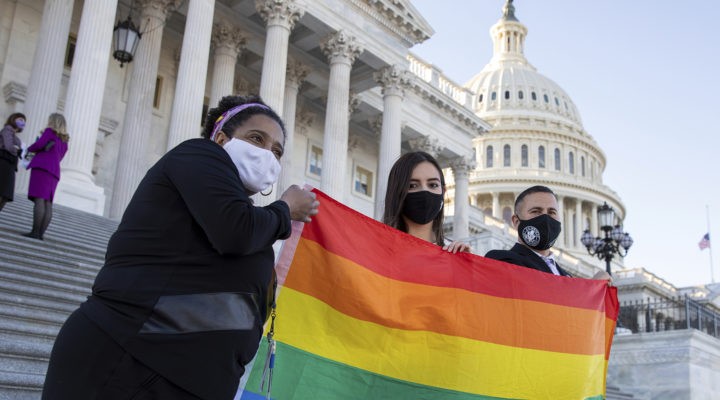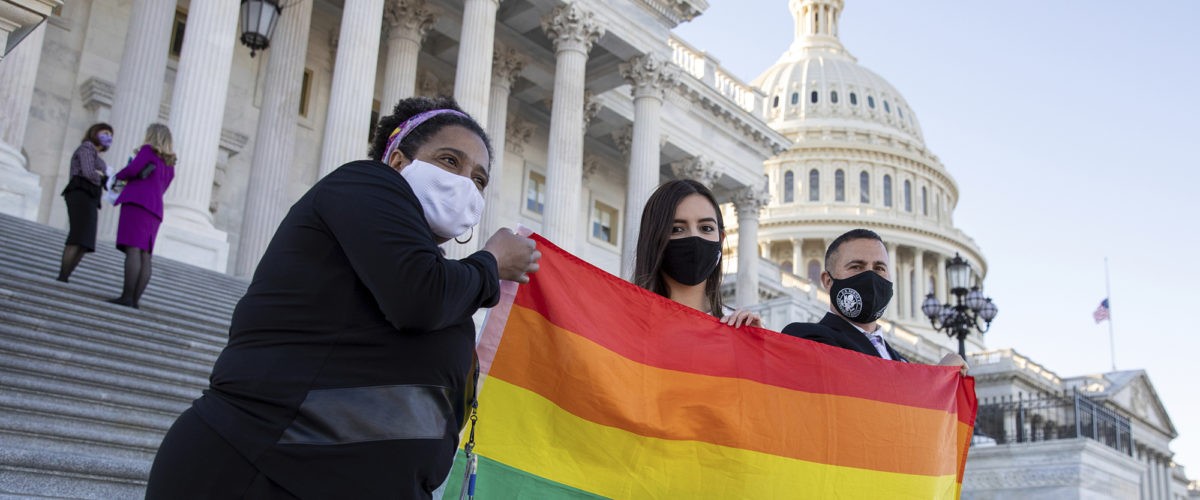Advocating for the Equality Act offers a meaningful way to push back against the faith-based white supremacy that oppresses LGBTQ Americans just as it always has done to women, people of color and members of minority religions, a panel of Baptists agreed during a June 29 BNG webinar.
The June 29 webinar, “Baptists and the Equality Act,” featured five panelists who explained why they believe supporting this legislation — already passed by the U.S. House and now pending in the Senate — is a matter of faith conviction. The act would ensure federal non-discrimination protections for non-heterosexual people in housing, employment, education and other areas of life.
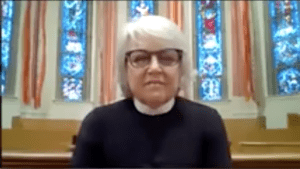
Nancy Petty
The white Christian church’s historic and central role in fostering systemic racism and other forms of discrimination provides context to why conservative white Christians, including the Southern Baptist Convention, oppose the measure, said Nancy Petty, pastor of Pullen Memorial Baptist Church in Raleigh, N.C.
“We have to address how Christianity – white Christianity – is writing this narrative in a way that discriminates, and we have to say that’s not the narrative and that there is another narrative here, one of religious liberty for all,” she said.
And once again, the role played by Christian nationalism in opposing the Equality Act should be a wake-up call, Petty added. “We are going to be talking about these things as long as the white Christian church continues to see this nation as a Christian nation and define it that way.”
Petty was joined on the panel by Timothy Tee Boddie, former general secretary and chief administrative officer of the Progressive National Baptist Convention; Guthrie Graves-Fitzsimmons, a fellow with the Faith and Progressive Policy Initiative at the Center for American Progress and a member of Highland Baptist Church in Louisville, Ky.; Amanda Hambrick Ashcraft, executive minister for community development and justice at Middle Collegiate Church in New York City; and Michael-Ray Mathews, board president of the Alliance of Baptists.
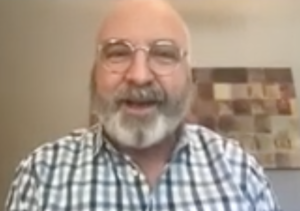
Mark Wingfield
Moderated by BNG Executive Director Mark Wingfield, the discussion held via Zoom and livestreamed on Facebook ranged into topics such as the competing views of religious freedom that frame the Equality Act debate, analysis of the SBC’s recent resolution condemning the legislation, why Baptists’ should have a particular concern for the oppressed and how people of faith can support the measure.
Wingfield highlighted that religiously motivated opposition to the Equality Act hinges on the fear that it will inhibit the religious right to discriminate against LGBTQ persons.
Graves-Fitzsimmons noted the irony of such views.
“It’s so sad to portray religious freedom as license to discriminate,” he said. “The Equality Act is a monumental achievement for religious freedom. … It is a victory welcomed by religious minorities who face discrimination based on religion.”
Graves-Fitzsimmons explained that the act would expand federal civil rights protections into spaces where much of life is lived, including retail shops, ride-sharing services and shopping malls — protections most Americans assume are given to all but in reality are not.

Amanda Hambrick Ashcraft
Claims that the Equality Act will deny religious conservatives their religious freedom is a narrative that must be countered with one extoling the truth, Hambrick Ashcraft said. “We need to be, especially as faith leaders, loud and clear and explicit that passing the Equality Act is not asking anyone to change their beliefs. It’s just a fundamental human and moral right that people are protected against discrimination.”
The idea that all people should be treated equally also is the driving principle behind racial justice that should be extended to everyone, Boddie said. “I come at it from a faith perspective. It is a moral imperative that we surround each other and that we lift each other up in an equal way under the law and not get into all the differences we have about what we believe.”
Conservative Christian claims of religious infringement also were used to oppose civil rights for persons of color, he said. “This same argument was used during segregation. They want the right to discriminate in restaurants and interstate travel. You can feel that way, but you don’t have the right to do that with people who are, in fact, born in the image of God, just as everyone else.”
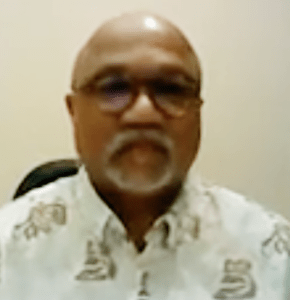
Tee Boddie
Boddie added that his work with Baptist Joint Committee for Religious Liberty underscores the axiom that a threat to anyone’s religious liberty is a threat to the religious liberty of all — including LGBTQ Americans. “We’re not asking that anyone change their beliefs, but that everyone be treated equally.”
At the same time, Boddie said, he has to acknowledge that discriminatory attitudes regarding sexual orientation also exist in the African American church, among people who have fought so hard for their own freedoms.
“White theology has crept into the Black church and continues to foster this idea that the Black church can discriminate against anybody for any reason,” he said. “How is it that a church that emerged out of a struggle for freedom would oppress its own members? As a straight member, I have come out of the closet as an ally of the LGBTQ community.”
That move hasn’t been fashionable, he added, but it’s work that needs to be done. “I want them to free themselves because when you oppress others you oppress yourselves.”
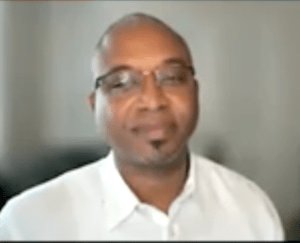
Michael-Ray Mathews
Mathews said he’s found that interacting with gay, lesbian and transgender people has enriched his faith as a Baptist Christian.
“I am liberated through relationship with queer kindred,” he said. “This Equality Act is on the table because there are so many of our kindred who are experiencing oppression and do not have access to the freedom all people should have.”
Progressive Christians must stand up to the discriminatory arguments and actions of white supremacists and Christian nationalists, Petty reiterated. “As liberals, we keep letting the other side tell the story in a way that keeps protecting these lies,” she said, adding that the push back must be, “No, your narrative is wrong and here is another narrative that includes all of us.”
When Wingfield asked panelists to respond to the SBC’s recent resolution condemning the Equality Act, Petty said such a stance has become second nature for the denomination.
“Southern Baptists have always had a litmus test, and you can follow it historically as they deem who is outside and who is on the inside. Blacks. Women. Divorced. Today it’s the LGBTQ community. It’s gay people. Ten years from now it will be somebody else. It seems, historically, they need someone, some group, to marginalize and to deem the enemy of Christian theology and their faith.”
The Equality Act represents that threat today because, if enacted, it would undermine the SBC’s efforts to control the message of who is, and who isn’t, freed by the Holy Spirit, she said. “If that message gets out of control, they have no control, and somehow that is the biggest threat of all to them.”

Guthrie Graves-Fitzsimmons
Graves-Fitzsimmons said the SBC resolution runs counter to national polling that consistently shows support for civil rights protections for LGBTQ persons across religious groups, including white evangelicals: “People in the pews actually approve these nondiscrimination protections for the LGBTQ community.”
However, that support isn’t translating into consistent action, Boddie said. “We know the Southern Baptists; we are shocked but not surprised. But it is those in the surveys who are for the act but who don’t say anything, who will not stand up. And when you don’t stand up, you’re just as guilty and just as complicit with the status quo until you are able to be a vocal ally in this movement.”
To be that ally, Boddie said Christians should “bombard their senators with voices” while Petty encouraged broaching the topic anywhere neighbors are encountered. Guthrie noted that more Americans need to be educated about the act — especially those who mistakenly believe the protections provided in the Equality Act already are law.
“We need to do anything we can do in any state,” Graves-Fitzsimmons said, adding that a Baptist witness in favor of the legislation would be a surprise in a society that assumes all Baptists are anti-LGBTQ conservatives. “Let’s use that to our advantage.”
Petty said the Baptist concept of soul freedom provided the latitude and courage to work from her Southern Baptist upbringing to become who she is today — a lesbian and ordained minister called to help others work through similar journeys.
Hambrick Ashcraft said her faith compels her to advocate for the oppressed: “Freedom is absolutely what speaks to my Baptist roots.”
Boddie said it’s the liberty of others that he is called to defend as a Baptist. “It’s freedom that draws me to this situation, that draws me to this conversation — the freedom of people to live their own truth, within their own faith — that really drives my passion around this issue.”
Watch the full webinar here.
Related articles:
Equality Act stirs passions about the definition of religious liberty and RFRA’s role

